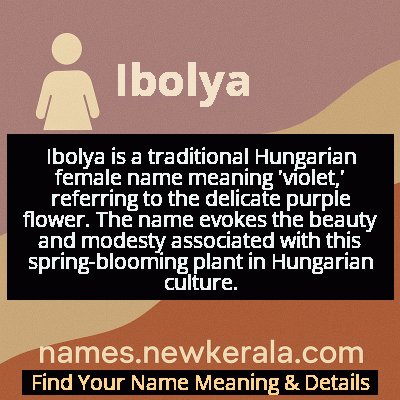Ibolya Name Meaning & Details
Origin, Popularity, Numerology Analysis & Name Meaning of Ibolya
Discover the origin, meaning, and cultural significance of the name IBOLYA. Delve into its historical roots and explore the lasting impact it has had on communities and traditions.
Name
Ibolya
Gender
Female
Origin
Hungarian
Lucky Number
1
Meaning of the Name - Ibolya
Ibolya is a traditional Hungarian female name meaning 'violet,' referring to the delicate purple flower. The name evokes the beauty and modesty associated with this spring-blooming plant in Hungarian culture.
Ibolya - Complete Numerology Analysis
Your Numerology Number
Based on Pythagorean Numerology System
Ruling Planet
Sun
Positive Nature
Leaders, ambitious, highly driven, self-reliant, innovative.
Negative Traits
Overly aggressive, domineering, impatient, selfish.
Lucky Colours
Red, orange, gold.
Lucky Days
Sunday.
Lucky Stones
Ruby, garnet.
Harmony Numbers
2, 3, 9.
Best Suited Professions
Entrepreneurs, managers, engineers.
What People Like About You
Courage, determination, leadership.
Famous People Named Ibolya
Ibolya Dávid
Politician
First female Minister of Justice in Hungary
Ibolya Oláh
Singer
Popular Hungarian pop singer with multiple hit albums
Ibolya Csák
Athlete
Gold medalist in high jump at 1936 Berlin Olympics
Ibolya Kovács
Journalist
Influential Hungarian television presenter
Name Variations & International Equivalents
Click on blue names to explore their detailed meanings. Gray names with will be available soon.
Cultural & Historical Significance
The name's popularity peaked in the early 20th century and remains a classic choice that evokes traditional Hungarian values while maintaining timeless elegance. In Hungarian literature and folk traditions, the violet (ibolya) appears frequently as a symbol of humility and quiet beauty, characteristics that became associated with women bearing this name. The enduring appeal of Ibolya demonstrates how traditional Hungarian names continue to connect modern Hungarians with their cultural heritage and natural environment.
Extended Personality Analysis
Women named Ibolya are often perceived as gentle yet resilient individuals who combine traditional values with inner strength. They typically exhibit artistic sensitivity, emotional depth, and a quiet determination that serves them well in both personal and professional pursuits. The floral association suggests someone who appreciates beauty in all forms and possesses natural grace. Ibolya's tend to be loyal friends and partners, valuing deep connections over superficial relationships.
Their personality often balances delicate sensitivity with practical wisdom, making them both compassionate and reliable. Many Ibolya's demonstrate strong intuition and creative problem-solving abilities, approaching challenges with both imagination and persistence. While they may appear reserved initially, they reveal warmth and wit to those they trust. The name's connection to the violet flower - which blooms modestly but persistently - reflects the characteristic combination of humility and strength often found in women named Ibolya.
Modern Usage & Popularity
In contemporary Hungary, Ibolya maintains steady but moderate popularity as a traditional choice that appeals to parents seeking classic Hungarian names with natural beauty. While it peaked in the early 1900s, the name has experienced a mild resurgence among families interested in reviving traditional Hungarian names. It ranks outside the top 100 most popular names but remains well-known and respected. The name is particularly favored by educated urban families who appreciate its cultural heritage and elegant sound. International usage is rare, making it distinctly Hungarian outside Hungary, though Hungarian diaspora communities continue to use it to maintain cultural connections.
Symbolic & Spiritual Meanings
Symbolically, Ibolya represents modesty, faithfulness, and spiritual wisdom in Hungarian tradition. The violet flower associated with the name carries meanings of humility and delicate strength - blooming quietly but persistently. In floral symbolism, violets often represent watchfulness, loyalty, and the return of happiness after difficult times. The name also connects to spring symbolism, suggesting renewal, fresh beginnings, and the awakening of nature. In Hungarian folk traditions, violets were believed to bring good fortune and protect against evil spirits, adding a layer of protective symbolism to the name. The combination of these meanings creates a rich symbolic profile that encompasses both practical virtues and spiritual qualities.

